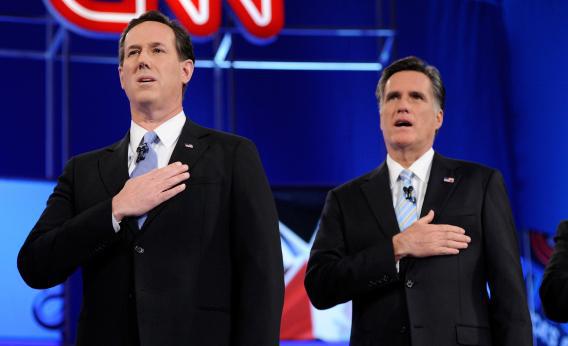The Republican Party’s U.S. presidential hopefuls are relying on faith for more than just the religious vote - it’s key to their economic plans. Romtorumgrich are promising to cut taxes and simultaneously shrink the deficit. Economists criticize their math, which doesn’t add up. The candidates say critics don’t use “dynamic scoring” to account for the stronger growth that would result from lower taxes. Neither should voters.
Rick Santorum and Newt Gingrich, runners up to Mitt Romney after the Super Tuesday primaries, want deep tax cuts and a balanced budget. Yet the nonpartisan Committee for a Responsible Federal Budget says the deficit would swell under either’s vision. Its intermediate budget-cutting scenario shows Santorum’s and Gingrich’s plans would inflate the deficit by $4.5 trillion and $7 trillion, respectively, over nine years.
Romney’s proposals don’t do much better. His income tax cuts and Alternative Minimum Tax repeal would boost the deficit by $3 trillion over a decade, according to the nonpartisan Tax Policy Center. Pile on reductions to capital gains, estate and corporate taxes and the number balloons to Gingrichian levels.
The candidates dispute these independent estimates, saying they only consider a static scenario where growth remains constant with or without their tax cuts. The three instead rely on what is known as dynamic scoring, which considers the impact fiscal policy changes would have on economic behavior. Their models assume reduced tax rates will pump up overall growth and, with it, government tax receipts.
While that may be the case, the trillion-dollar question centers on magnitude. There is no economic consensus on the precise impact tax cuts have on growth, which is why most economists agree that dynamic scoring won’t pump up tax revenue the way the candidates hope. Romney economic adviser Greg Mankiw himself published a 2005 study that showed tax cuts don’t pay for themselves dollar for dollar.
For argument’s sake, though, take the rosy assumption that Santorum’s tax cuts could pay for half their cost. He would still need to shave $3 trillion in spending over nine years to achieve a balanced budget.* The chances of that happening are remote, as the failure of Congress last year to agree on $1.2 trillion in cuts during the debt ceiling debate shows. But then again, with a little faith anything is possible - at least that’s what the three GOP candidates seem to want voters to believe.
Read more at Read more at Reuters Breakingviews.
*Correction, March 8, 2012: This piece originally stated that Santorum would need to cut $3 billion in spending over nine years to attain a balanced budget. He would need to cut $3 trillion.
